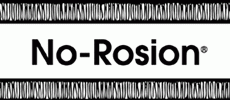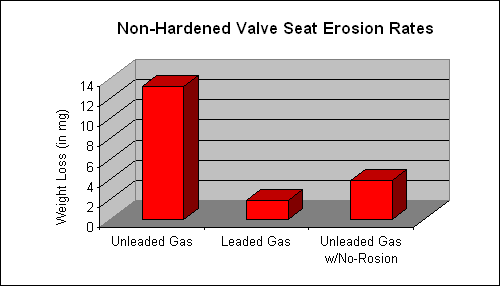

![]()
|
|
|
|
|
|
|||
|
We have conducted extensive research into the effects of running engines built prior to the early 1970's on unleaded fuel. One of the things observed was that excessive heat caused by detonation results in brinelling damage to non-hardened valve seats. Brinelling is a process in which the metal seat softens due to cylinder heat that is beyond what it was originally designed to tolerate. Recession therefore occurs at an accelerated rate when engine cylinder heads run too hot, for too long. No-Rosion Fuel System Octane Booster is a highly concentrated, proprietary formula of methylcyclopentadienyl manganese tricarbonyl (MMT) in a high flash point aromatic solvent. It increases the thermal stability of low octane fuel so the mixture does not spontaneously pre-ignite during combustion. This prevents detonation, and allows more efficient and complete ignition of fuel, which, in turn, creates more horsepower and results in cooler running engines. This is especially the case for engines with a compression ratio greater than 9.5:1, that do not have computer-controlled knock sensors. Additionally, our research indicates that unleaded fuel causes non-hardened valve seats to erode 10-20 times faster than when leaded fuel is used. The No-Rosion Fuel System Octane Booster formula solves this problem by inclusion of the metallic manganese in the MMT ingredient. It provides lubricity to non-hardened valve seats, in much the same manner as metallic lead in tetraethyl lead. (This is graphically illustrated in the chart below.) But unlike tetraethyl lead, MMT is non-toxic, and therefore poses no special health risks, and does not pollute the environment. |
|||
 |
|||
|
What differentiates No-Rosion Octane Booster from other products? No-Rosion Fuel System Octane Booster is EPA-approved, and can be used in any grade of leaded or unleaded fuel, including all ethanol blends. Unlike many other leading octane boost products, it does not contain oxygenates (ethanol, methanol, or MTBE). The stable, metallic MMT ingredient in our product is far more effective in boosting octane than oxygenates. And unlike oxygenates, it will not cause drying and cracking of rubber and plastic parts. It is completely safe for catalytic converters. In fact, when used vehicles with catalytic converters, it provides the additional benefit of reduced emissions. Phosphorus is an anti-wear additive commonly found in many brands of engine oil today. During combustion, trace amounts of phosphorus from the crankcase make their way into exhaust gases. Over time, phosphorus builds up on catalyst surfaces, causing a reduction in catalyst efficiency, and increased emissions. The proprietary blend of MMT in our formula protects against deterioration of emissions performance by preventing buildup of phosphorus in catalytic converters. This restores catalyst efficiency and reduces emissions. DIRECTIONS FOR USE: Street-driven vehicles add one 8 ounce bottle of concentrated product to 20 gallons of gasoline to boost octane by 10 points (1 number). Off-road and race vehicles add two 8 ounce bottles to 20 gallons of gasoline to boost octane by 20 points (2 numbers). Non-catalyst off-road and race vehicles can add four 8 ounce bottles to 20 gallons of gasoline to boost octane by 40 points (4 numbers). Adding more than one bottle to 20 gallons of gasoline is not EPA approved, and therefore not street-legal. Use in conjunction with No-Rosion Fuel System Combustion Optimizer to achieve synergistic performance enhancements. |
|
 |
|
DID YOU KNOW... No-Rosion was in the cooling systems and fuel systems of ten award-winning classics at the 2025 Pebble Beach Concours d'Elegance! Copyright 2026 Applied Chemical Specialties, Inc. |